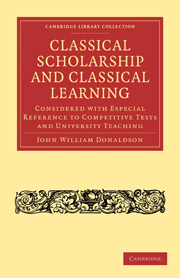 Classical Scholarship and Classical Learning
Classical Scholarship and Classical Learning I - University Teaching
Published online by Cambridge University Press: 05 October 2010
Summary
The common opinion, that our great Universities arbitrarily, and therefore perhaps erroneously, confine the main part of their studies and examinations to the two departments of classics and mathematics, which form the basis of liberal education in this country, has recently found an exponent no less able than influential in the person of His Royal Highness the Prince-Chancellor of Cambridge. In a speech delivered at Birmingham, on the 22nd November, 1855, when he laid the foundation of the Midland Institute, after arguing, with his usual felicity of thought and language, against the vulgar depreciation of scientific as contrasted with practical knowledge, Prince Albert said:—
“The study of the laws by which the Almighty governs the Universe, is therefore our bounden duty. Of these laws our great academies and seats of education have, rather arbitrarily, selected only two spheres or groups (as I may call them), as essential parts of our national education—the laws which regulate quantities and proportions, which form the subject of mathematics, and the laws regulating the expression of our thoughts through the medium of language—that is to say grammar, which finds its purest expression in the classical languages. These laws are most important branches of knowledge; their study trains and elevates the mind. But they are not the only ones; there are others which we cannot disregard, which we cannot do without.
- Type
- Chapter
- Information
- Classical Scholarship and Classical LearningConsidered with Especial Reference to Competitive Tests and University Teaching, pp. 8 - 71Publisher: Cambridge University PressPrint publication year: 2010First published in: 1856
